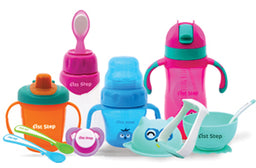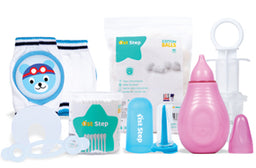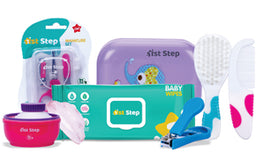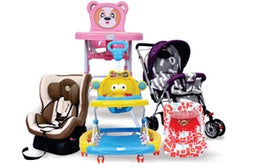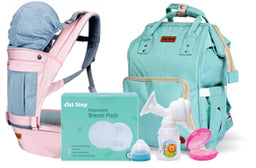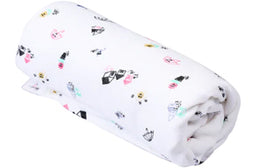Disposable vs Reusable Diapers: Which is Good for Babies?
The decision of whether to use disposable or reusable diapers is one that new parents must make carefully. It has an impact on your convenience and finances in addition to the environment and the health of your unborn children. Each choice has advantages and disadvantages of its own. Although they are convenient, disposable diapers add to landfill waste. On the other side, reusable diapers are environmentally beneficial but require more maintenance. In this discussion, we'll discuss the variables you weigh when choosing between these two diapering techniques to identify which is best for the well-being of your priceless child.
Differences: Disposable vs. Reusable Diapers
|
Aspect |
Disposable Diapers |
Reusable Diapers |
|
Cost |
Generally more expensive in the long run due to continuous purchases. |
Higher initial cost, but cost-effective over time as they can be reused. |
|
Convenience |
Highly convenient, as they are easy to use and dispose of. |
Require more effort in terms of washing and maintaining. |
|
Environmental Impact |
Generate a significant amount of non-biodegradable waste. |
Environmentally friendly, as they are washable and reusable. |
|
Absorbency |
High absorbency, often with added features like wetness indicators. |
Absorbency may vary based on the brand and type. |
|
Rash Risk |
Can contribute to diaper rash due to chemicals in some brands. |
Less likely to cause diaper rash due to breathable materials. |
|
Fit & Sizing |
Available in a wide range of sizes to suit different babies. |
Sizing may be limited, and adjustments may be needed as the baby grows. |
|
Storage |
Easy to store as they are compact and don't require much space. |
May require additional storage space for multiple cloth diapers. |
|
Eco-Friendly Options |
Some brands offer eco-friendly disposable diapers made from sustainable materials. |
Generally considered more eco-friendly due to reusability. |
|
Travel |
Convenient for travel as they are disposable. |
Require carrying soiled diapers when away from home. |
Advantages and Disadvantages of Disposable Diapers

Disposable diapers have a number of benefits, including convenience — being quick and simple to use and discard, they are perfect for parents who are often on the go. They frequently have excellent absorption capacities, and some have moisture indications. Several disposable diaper options are available, and they come in different sizes to fit different babies. They do, however, have substantial drawbacks. They produce a substantial amount of non-biodegradable garbage, which exacerbates landfill issues. Due to the chemicals in these diapers, some newborns may get nappy rash. Continuously buying disposables might add up over time. In addition, compared to reusable cloth diapers, their production uses resources and worsens environmental problems, making them less environmentally friendly.
Advantages and Disadvantages of Reusable Diapers

Reusable diapers have a number of benefits, including environmental friendliness, because they generate less waste and can be reused on your baby after proper sterilising. They frequently have permeable materials, which lowers the possibility of nappy rash. Despite having a larger initial cost, they eventually turn out to be cost-effective. Reusable diapers can have certain disadvantages, though. They need to be washed frequently, which takes time and could use more water and energy. As the baby grows, modifications in size are required. Soiled diapers can be awkward to carry outside, and some daycare centres prefer disposables. Overall, personal tastes, lifestyle, and environmental considerations all play a role in deciding between reusable and disposable diapers.
1st Step Baby Care Products
1st Step is a well-established brand specialising in baby care products, known for its commitment to quality and safety. Their extensive range includes baby diapers, wipes, baby care accessories, feeding bottles, and more. 1st Step prioritises the comfort and well-being of babies, offering products that are gentle on delicate skin and designed for convenience. They continually innovate to meet modern parents' and infants' evolving needs. With a reputation for reliability and affordability, 1st Step has earned the trust of countless families, making it a go-to choice for those seeking dependable and high-quality baby care solutions.
Takeaway
The decision between disposable and cloth diapers for infants is up to the parent; it depends on your priorities and the situation. Despite their convenience and potential chemical content, disposable diapers add to landfill waste. Although they are more labour-intensive to wash and maintain, reusable diapers are environmentally friendly. Budget, environmental considerations, the comfort of the infant, and the parenting style should all be taken into account while making the choice. Some parents even combine the two choices to strike a balance between practicality and sustainability. The baby's well-being should always come first; either decision can be wise if carefully thought through.
Frequently Asked Questions (FAQs)
1. Which diaper is best for a baby, reusable or disposable?
Reusable or disposable diapers should be chosen based on lifestyle, personal preferences, and environmental considerations. Reusable diapers are more environmentally beneficial but take more work, whilst disposable diapers are more convenient but produce trash. To choose what is best for their child, parents should consider these things.
2. Are reusable diapers good or bad for babies?
Baby-safe reusable diapers are typically accepted. Since they are composed of breathable materials, nappy rash is less likely to occur. To preserve hygiene and avoid any potential problems, appropriate cleaning and maintenance are essential.
3. Which type of diaper is best for a baby?
The ideal nappy for a baby relies on the tastes and considerations of the individual. Reusable diapers are more environmentally friendly, while disposable ones are more practical. When making a decision, parents should take into account aspects including their money, convenience, and environmental concerns.
4. What is the disadvantage of disposable diapers?
Disposable diapers' main drawback is their damaging effects on the environment. They take hundreds of years to degrade and add to landfill debris. Additionally, the chemicals used in disposable diapers may cause diaper rash in some infants.
5. Which diaper is best for a baby in India?
Depending on the preferences of the parents, there are different options for disposable and cloth diapers in India. Reusable diapers are more eco-friendly, while disposable ones are more practical. To make the greatest decision for their infant, parents should take into account aspects like their money, convenience, and environmental impact.
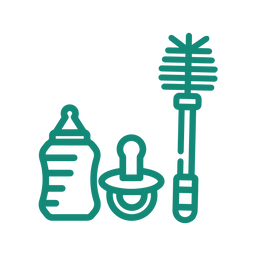 Feeding & Nursing
Feeding & Nursing Safety & Grooming
Safety & Grooming  Bathing & Diapering
Bathing & Diapering Baby Gear
Baby Gear Mother Needs
Mother Needs Muslin Essentials
Muslin Essentials Baby Toys
Baby Toys

